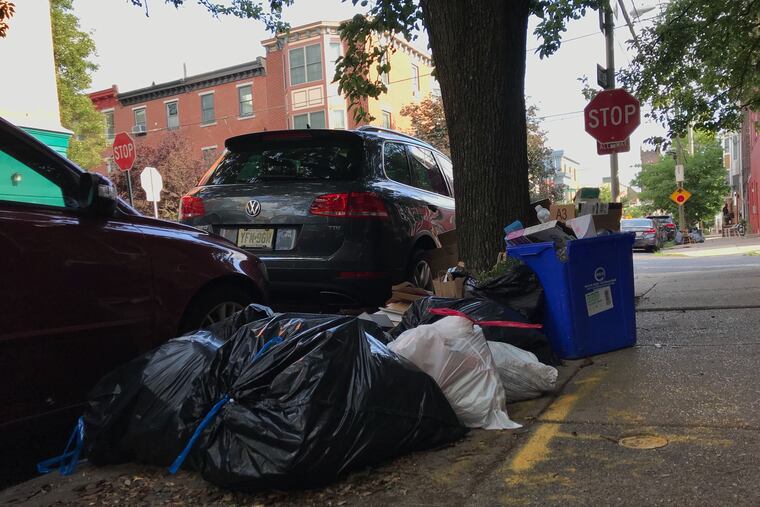Cancel Philly’s failed recycling program | Opinion
As sanitation delays plague Philly streets, let's focus on street sweeping instead of recycling, which is kind of a charade anyway.

The recycling menaces.
High Noon cans roll off the curb and into the street, kicked and flattened by oncoming cars. Plastic takeout containers spill out of paper bags and spring open in the middle of the sidewalk. Moldy Ragu jars crash and rupture into thousands of shards and who can say, after trying to clean up the mess, if the red blotches on the sidewalk are blood or gravy.
Cardboard is everywhere, pulped by rain, in giant sheathes and pizza box squares, and no one can pick it up without discharging hidden wrappers, cigarette butts, and Starbucks straws. Beware, anyway, the nesting roaches and rats.
After 15 or 18 or 20 days sitting curbside with pickup across Philadelphia delayed or suspended, a great mess of it has blown into sewer inlets, bottle caps stuck in the grates, foam packaging and water bottles hanging above the abyss of the wastewater system and ultimately our creeks and rivers and the Atlantic Ocean that is but dozens of miles away.
The response to the coronavirus has unleashed mountains of material: disposable masks and other protective clothing, restaurant meals packaged in polystyrene clamshells, Amazon boxes, and two to three times more plastic than before the pandemic.
» READ MORE: Philly mixed recycling in with trash to deal with backup, but city says it will catch up
Who is to handle it all?
Certainly not the corporations that produce it — they gladly pass all the cost of disposal to municipalities.
Not consumers. Philadelphians, with too little guidance from the Streets Department, have for decades failed to set their recycling out properly, tossing in trash and using paper bags and boxes that break easily instead of bins. Compounding the incompetence, the market for recyclable materials is anemic: Only a tiny portion of what we try to recycle ever becomes something new.
And then there is COVID-19. Researchers indicate that the virus can survive on plastic for 72 hours. Without proper protective equipment, the Philadelphia sanitation workers whose job it is to cart away the mess are worried for their safety and have been calling out. In a city experiencing fiscal emergency due to the pandemic — and with political and bureaucratic leadership challenged to protect the health and well-being of residents — the drop in personnel has meant that Philadelphia’s recycling program has become its own kind of public health crisis.
This is why it should be canceled, and the money saved, about $2.5 million in tonnage fees plus significant efficiencies in collection, used to clean our wretched streets and sidewalks. (Mayor Jim Kenney’s pre-COVID-19 budget had included $10.5 million for a new citywide street-cleaning program that has since been canceled.)
Keeping our streets clean should be the minimum standard of government, not an insurmountable obstacle that has vexed the city for 50 years. Now, in the time of COVID-19, more so: Public spaces need to be clean and safe if we are expected to spend so much time outside.
» READ MORE: Philly’s sanitation centers are getting overloaded as trash collection is delayed again
I have argued previously that recycling anyway is a kind of charade. Though it provides the individual a way to act responsibly as a steward of the earth, in fact it is an empty gesture. With the amount of plastic ending up in the world’s oceans likely to double by 2025, resulting in the mass killing of marine animals and speeding the warming of the water, the real problem is the surfeit of single-use material we consume without second thought.
Philadelphia officials seem to recognize this. Councilmember Katherine Gilmore Richardson has called for Philadelphians to reduce their waste (perhaps unlikely given the volume of plastic being used to safeguard against the spread of disease). Richardson chairs a City Council committee charged with examining large-scale solutions to the various interconnected ecological crises facing the city. I submit to the committee that ending Philadelphia’s failed recycling program should be a first order of business. Design a new program tailored to markets for materials. Develop new set-out methods that keep the menace off the streets.
In his first term, Mayor Kenney established an office of Zero Waste and Litter. The idea was that Philadelphia could implement data-based policy changes to reform the management of waste and recycling, ultimately keeping most of it off the street and out of our creeks and rivers. When the pandemic cut tax revenues by several hundred million dollars, the office was closed. Its former director, Nic Esposito, once explained to me that the way a society handles its waste reveals its values and the quality of its relationship to the environment. We humans, he added, are the only species on Earth not to process our own waste. That is because we can’t; we make too much of it. The menace, in other words, is our own making. We have the capacity and certainly the technology to escape it. But do we have the will?
Nathaniel Popkin’s forthcoming book is “To Reach the Spring: From Complicity to Consciousness in the Age of Eco-Crisis.”